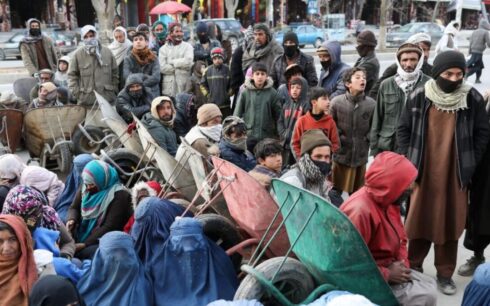A number of journalists raised alarms over increasingly restrictive working conditions after Neda Mohammad Nadim, the Taliban’s minister of higher education, prohibited filming at an event in Khost Province.
The ban, implemented during a visit to Sheikh Zayed University, has sparked criticism, with reporters saying their ability to do their jobs is being severely curtailed.
Nadim, considered a close associate of the Taliban’s supreme leader, warned journalists attending the event that filming living beings is a sin, ordering them to stop all visual documentation.
“Filming living creatures is sinful and must not continue,” Nadim told reporters, according to one journalist in Khost who spoke anonymously for security reasons. “It’s disheartening because without visuals, how can we accurately report on the events we cover?”
This latest prohibition is part of a broader trend of media repression under the Taliban. Of the 10 television stations that were operating in Khost before the Taliban regained power, only three remain active, and even these face an uncertain future. Similar restrictions have already been enforced in other provinces, including Takhar and Kandahar, where visual media outlets have been shut down due to the Taliban’s ban on filming living beings.
In September, the national broadcaster in Kandahar was forced to close, followed by the closure of the state television station in Takhar in October. The Taliban’s Ministry for the Propagation of Virtue and the Prevention of Vice has confirmed that the ban on filming living beings will gradually be implemented across all provinces. “State media has been instructed not to broadcast images of living beings,” a ministry official in Takhar said, adding that the new rules would be enforced “progressively, not through coercion.”
The ministry has also launched social media campaigns to discourage photography and videography of living creatures, including animals. Mohammad Yahya Arif, a cleric with the Ministry for the Propagation of Virtue, stated: “Filming all living creatures, from donkeys to dogs, lions to birds, is forbidden. Such images must not be bought, sold, or kept in homes. When we declare something forbidden, it is based on Sharia, not personal opinion.”
The Taliban’s decree is codified in Article 17 of their law on the promotion of virtue and the prevention of vice, which prohibits the publication of images of living beings.
The restrictions come as media freedom in Afghanistan continues to erode. According to Reporters Without Borders, 547 media outlets were operating before the Taliban’s return to power. Since then, 80 television stations, 137 radio stations, and 13 news agencies have ceased operations, underscoring the grim state of press freedom in the country.





